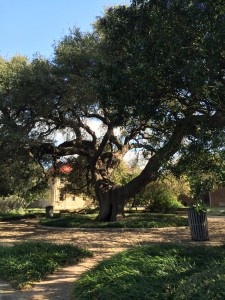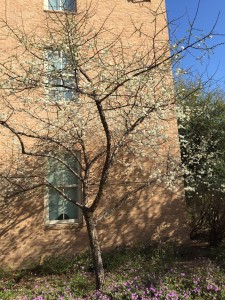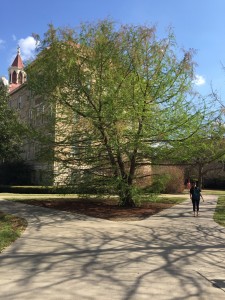I am most comfortable when indoors. Simply put, I like being in my room, sitting on my couch, and knowing that I have a solid roof over my head. However, I’ve recently come to realize that sitting outside, feeling the cool breeze touch my face, smelling the fresh perfume of the new flowers in bloom, could provide me the same sort of satisfaction. I was unable to realize this during the winter season, but as the seasons have changed and given me more of an opportunity to be outside I’ve realized that the spring positively impacts my personal enjoyment.
Time and time again, as I’ve sat around various parts of the St. Edward’s University campus, I found that there is this hum ever present, no matter the time of day. I had never actually sat down to pay attention to it until now, but it’s there. I can only deduce that it’s the sound of cars passing along Interstate 35, which runs east of our campus. However, I found that this hum is representative of far more than cars zipping by. It represents the civilization and society we are a part of; the intricate transportation system we’ve built, the machines we use constantly to warm and cool our residences, the machines we use to prepare and to preserve our food. There is constant noise, and while some try to escape it, I find comfort in it. I’ve learned to trust that if I can hear that hum, I’m safe. There are hospitals near if I become ill, there are public servants driving patrolling our streets, there is a sense of ease that comes from this hum.
Yet this hum comes at great cost to nature. The same roads that can quickly get us from point A to point B, from home to work, from the grocery store to school, from an accident to the hospital, were only possible via the destruction of natural greenery and the use of resources made from nature. Human development isn’t entirely a bad thing. In fact, we’ve advanced extensively as a society due to our infrastructural growth. But we also know that unchecked growth can come at great environmental costs.
I believe that government should play more of an active role in being environmentally friendly and sustainable. Our government should recognize that environmental consciousness is not antibusiness or anti commercialism, rather that they can coexist to benefit society, business, and the environment. As the semester progresses my goal is to meet with local officials that directly impact environmental policy. The goal is to meet with someone from Travis County, the City of Austin, the State of Texas and someone from St. Edward’s University.
As I prepare to meet with these individuals I feel that the best way I could prepare is to independently research how the local, state, and federal governments are being more sustainable and environmentally sound via the avenue of policy making.
The State of Texas has The Texas Commission on Environmental Quality, which deals with state matters relating to the environment. According to the Biennial Report, which was presented to the State of Texas’ 84th Legislature the commission’s mission states, “The Texas Commission on Environmental Quality strives to protect our state’s public health and natural resources consistent with sustainable economic development. Our goal is clean air, clean water, and the safe management of waste” (Biennial Report). As I read this and considered sustainability and environmental protection, I was a bit disheartened to realize that the commission doesn’t have either the word “sustainability” or phrase “environmental protection”. I know that Texas is generally known as a conservative, business focused state, so I am curious to understand the commission’s general direction when I speak to someone from there in the coming weeks/months.
On the federal level, according to Congressional Digest, in 1992 most of the world’s nations came together and agreed to the UNFCCC (United Nations Framework Convention on Climate Change) which seeks to “stabilize greenhouse gas concentrations” on our planet (Congressional Digest). Fast-forward to December of 2015 and the United States along with 195 other agents agreed to bind almost every country to lower greenhouse gas emissions (Congressional Digest). The actions taken by the current administration and the Paris agreement give me much hope for the future of environmental policy in this country. However, what is incredibly frightening is that there has been a lot of rhetoric tossed around from the conservative party about repealing actions taken by President Barack Obama’s administration. Although unusual for our government to back track in terms of foreign policy, it’s still unsettling.
As far as the city goes, the City of Austin has an Environmental Commission which was established to “advise the city council” among others in regard to fourteen topics. They range from water quality to roadway planning, and air quality to noise abatement (Bylaws of the Environmental Board). Something that struck me is that in the Bylaws of the Board (now commission) specifically mention “environmental awareness” as one of their focuses. As someone who has lived in Austin for just about two years now, I certainly feel that the municipal government is concerned with the environment. Austinites are concerned with their green spaces and that is reflected in the spaces that exist and established governmental groups such as the Environmental Commission.
Travis County has a department called Transportation and Natural Resources and under that department there is an Environmental Quality Program. The Environmental Quality Program focuses mainly on enforcement of policy, however a sub topic in their mission states that aim to do “public education, outreach, and implementation”. This is a good point in their mission to strive for, however, over all I feel like since the department is so removed from say the Travis County Commissioners Court (as opposed to the Environmental Commission which reports directly to the Austin City Council).
Given that I understand that the local, state, and federal governments have avenues which can be used to navigate environmental policy, I am excited to embark on the next part of this process which will be to speak or meet with individuals from the various levels and further understand the obstacles that lie in way of policy making that might more aggressively enforce sustainability and environmental conservation. If policy doesn’t more insistently demand more stringent regulations that better our world, I won’t be able to further my new relationship with nature – a relationship I intend to maintain and hopefully foster in my children.
Works Cited
Athanasiou, Tom. “Paris And After.” Earth Island Journal 30.4 (2016): 37-41. GreenFILE. Web. 27 Feb. 2016.
austintexas.gov. AustinTexas.gov The Official Website of the City of Austin . 1 January 2015. 27 February 2016 <https://www.austintexas.gov/envboard>.
“FY2013-2014 Biennial Report: Letter from the Commission.” FY2013-2014 Biennial Report: Letter from the Commission. Texas Commission on Environmental Quality, 07 Dec. 2015. Web. 27 Feb. 2016.
Congressional Digest . “Combating Climate Change The Paris Agreement and U.S. Carbon Emission Reduction Plans.” Congressional Digest 1 January 2015.
traviscountytx.gov. TravisCountyTX.gov. 1 January 2015. 27 February 2016 <https://www.traviscountytx.gov/tnr/environmental-quality/about>.


